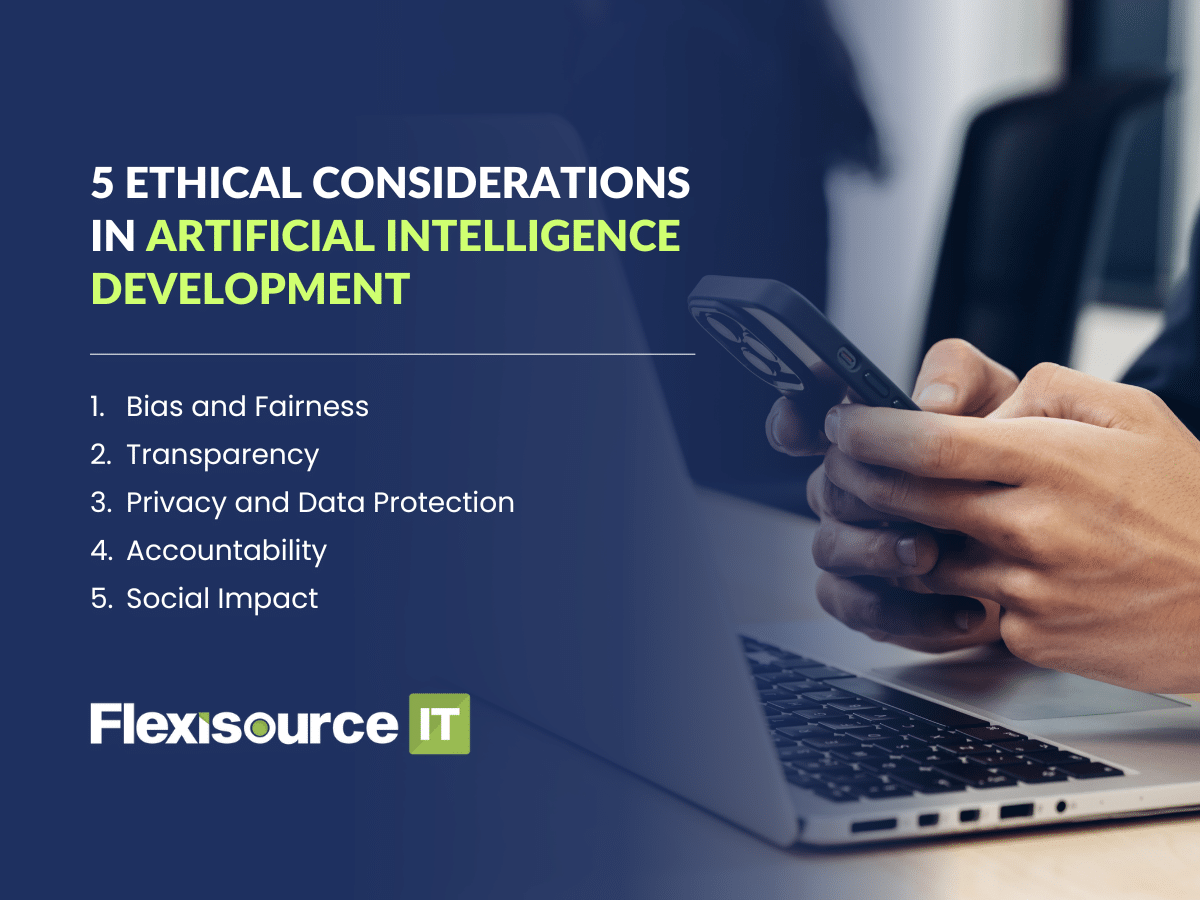As artificial intelligence (AI) continues to revolutionise various sectors, its development is met with significant ethical challenges. These challenges are not just technical; they touch upon fundamental human values and societal norms.
With that said, the ethical considerations surrounding their development become increasingly crucial. Responsible AI development is not just about creating powerful algorithms; it’s about ensuring these technologies are fair, transparent, and accountable.
Likewise, this article explores five key ethical considerations in AI development: bias and fairness, transparency, privacy and data protection, accountability, and social impact.
5 Ethical Considerations in Artificial Intelligence Development

Bias and Fairness
As we delve deeper into the ethical considerations in AI development, one of the most pressing issues that arises is bias and fairness in these systems.
Bias in AI refers to the systematic and unfair discrimination that occurs when an AI system makes decisions or predictions. This bias often stems from the data used to train the models, which may reflect existing social inequalities.
The implications of AI bias can be profound. For instance, an AI system trained on biased data may produce discriminatory outcomes, reinforcing stereotypes or unfairly favoring one group.
For example, when hiring, an AI tool might screen out qualified candidates from underrepresented groups if the training data is skewed toward a particular demographic. Similarly, AI-driven financial systems might offer less favorable loan terms to certain ethnic groups, perpetuating economic disparities.
With that said, mitigating AI bias requires a multifaceted approach. Developers must first recognise the potential for bias in their data and algorithms. This involves diversifying training datasets, applying fairness-aware machine learning techniques, and regularly auditing AI systems to identify and correct biases. Moreover, collaboration with ethicists, sociologists, and other experts can also help understand and address the broader social implications of AI bias.
Transparency
While addressing bias is critical to ensuring fairness, another significant ethical considerations in AI development is transparency.
Transparency in AI development refers to the clarity and openness of AI systems. It involves making the decision-making processes of AI systems understandable to users and stakeholders.
However, most AI faces challenges in achieving transparency. AI has complex models, particularly deep learning algorithms. Transparency in AI development refers to the clarity and openness of AI systems. It involves making the decision-making processes of AI systems understandable to users and stakeholders.
To promote transparency, developers can use techniques such as explainable AI (XAI), which focuses on creating models that clearly explain their decisions. Additionally, maintaining detailed documentation of AI systems, including their design, training data, and decision-making processes, can enhance transparency.
Likewise, companies should be transparent about their AI systems’ limitations, ensuring that users understand the technology’s capabilities.
Privacy and Data Protection
Privacy is a fundamental human right; protecting it is a significant ethical consideration in AI development. AI in business often relies on vast amounts of data, including personal information, to function effectively. This data can be misused without proper safeguards, leading to privacy breaches and potential harm to individuals.
The risks to privacy in AI development are numerous. For example, AI systems used in surveillance can infringe on individual privacy by collecting and analysing vast amounts of personal data without consent. Similarly, AI-driven marketing strategies might exploit personal data to target individuals with invasive and manipulative advertising.
Ensuring data protection in AI development requires adherence to strict data governance practices. Developers should prioritise data minimisation, only collecting the data necessary for the task. Implementing robust encryption and anonymisation techniques can also help protect personal information.
Additionally, compliance with regulations such as the General Data Protection Regulation (GDPR) is essential to safeguard privacy and build public trust in AI technologies.
Accountability
Accountability is one of the most essential ethical considerations in AI development. It refers to the responsibility of developers, companies, and other stakeholders to ensure that AI systems are designed and used ethically. This includes being answerable for the outcomes of AI decisions, especially when they have significant social or economic impacts.
One of the primary challenges in ensuring accountability is the distributed nature of AI development. AI systems are often created by teams of developers, deployed by different organisations, and used by various end-users. This complexity can make it difficult to pinpoint who is responsible when something goes wrong, such as when an AI system makes a harmful or discriminatory decision.
Clear lines of responsibility should be established throughout the AI development process to enhance accountability. This can include assigning specific roles for monitoring and evaluating AI systems and creating mechanisms for redress when harm occurs. Additionally, ethical AI guidelines and frameworks can help organisations navigate the complexities of accountability, ensuring that AI systems are developed and used to align with societal values.
Social Impact
The social impact of AI encompasses the broader effects of AI systems on society, including their influence on employment, social structures, and human behavior. As AI advances, its social implications are becoming increasingly significant, raising ethical questions about how these technologies should be integrated into society.
AI’s social impact can be both positive and negative. On the one hand, AI can drive economic growth, improve healthcare, and enhance efficiency across various sectors. On the other hand, it can lead to job displacement, exacerbate social inequalities, and contribute to the erosion of privacy and autonomy.
To promote a positive social impact, developers and companies must consider the broader societal implications of their AI systems from the outset. This involves engaging with diverse stakeholders, including communities that may be affected by AI technologies.
Additionally, conducting social impact assessments can help identify potential risks and benefits, guiding the development of AI systems that contribute positively to society.
Conclusion
The ethical considerations in AI development are complex and multifaceted, touching on critical issues such as bias, transparency, privacy, accountability, and social impact. As AI continues to evolve, developers, companies, policymakers, and society must prioritise these ethical challenges to ensure AI technologies’ responsible and fair use.
At Flexisource IT, we are committed to developing AI solutions with ethical considerations at the forefront. We encourage transparency, accountability, and a deep commitment to promoting positive social impact. Contact us today to discuss how we can help you harness the power of AI responsibly.





